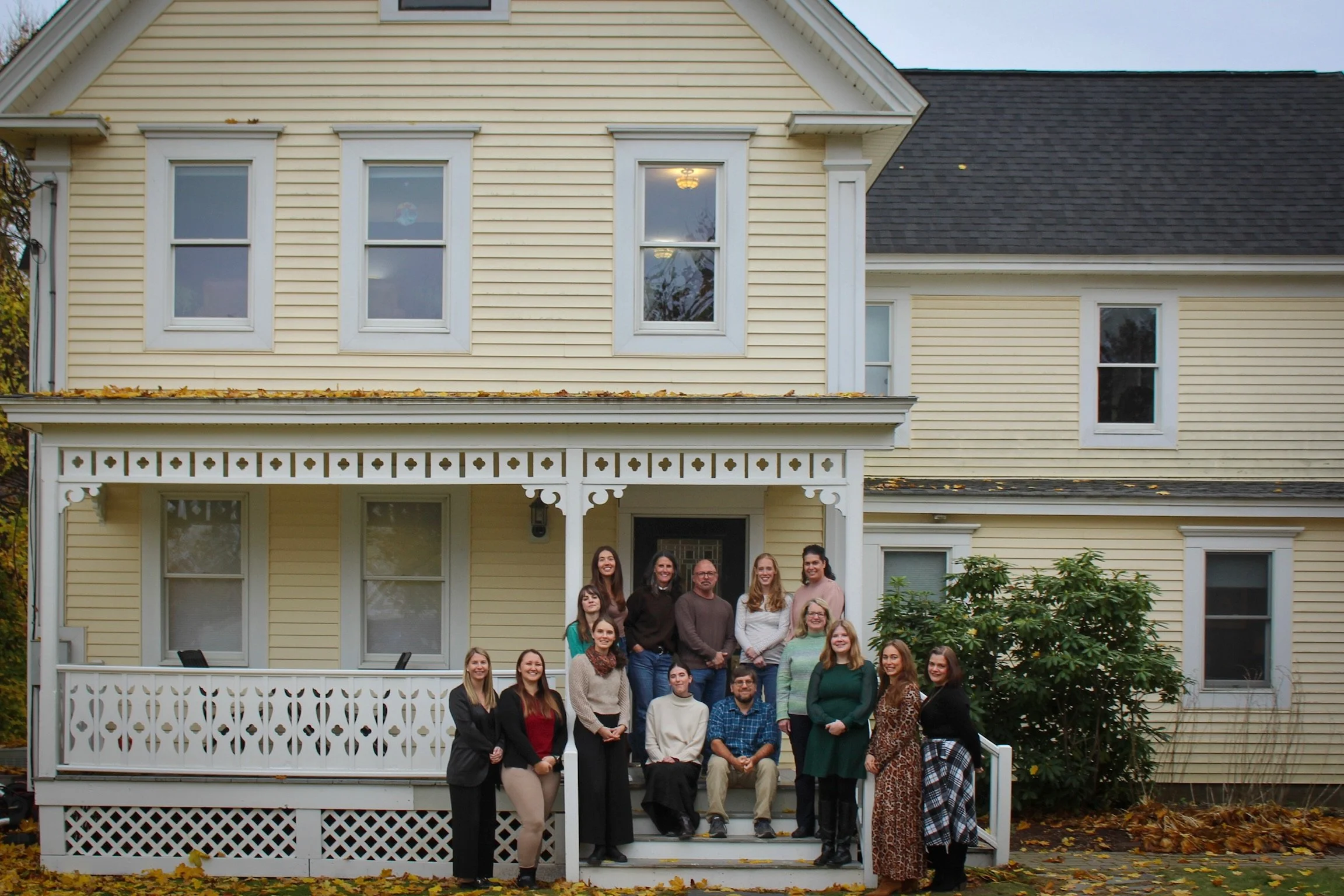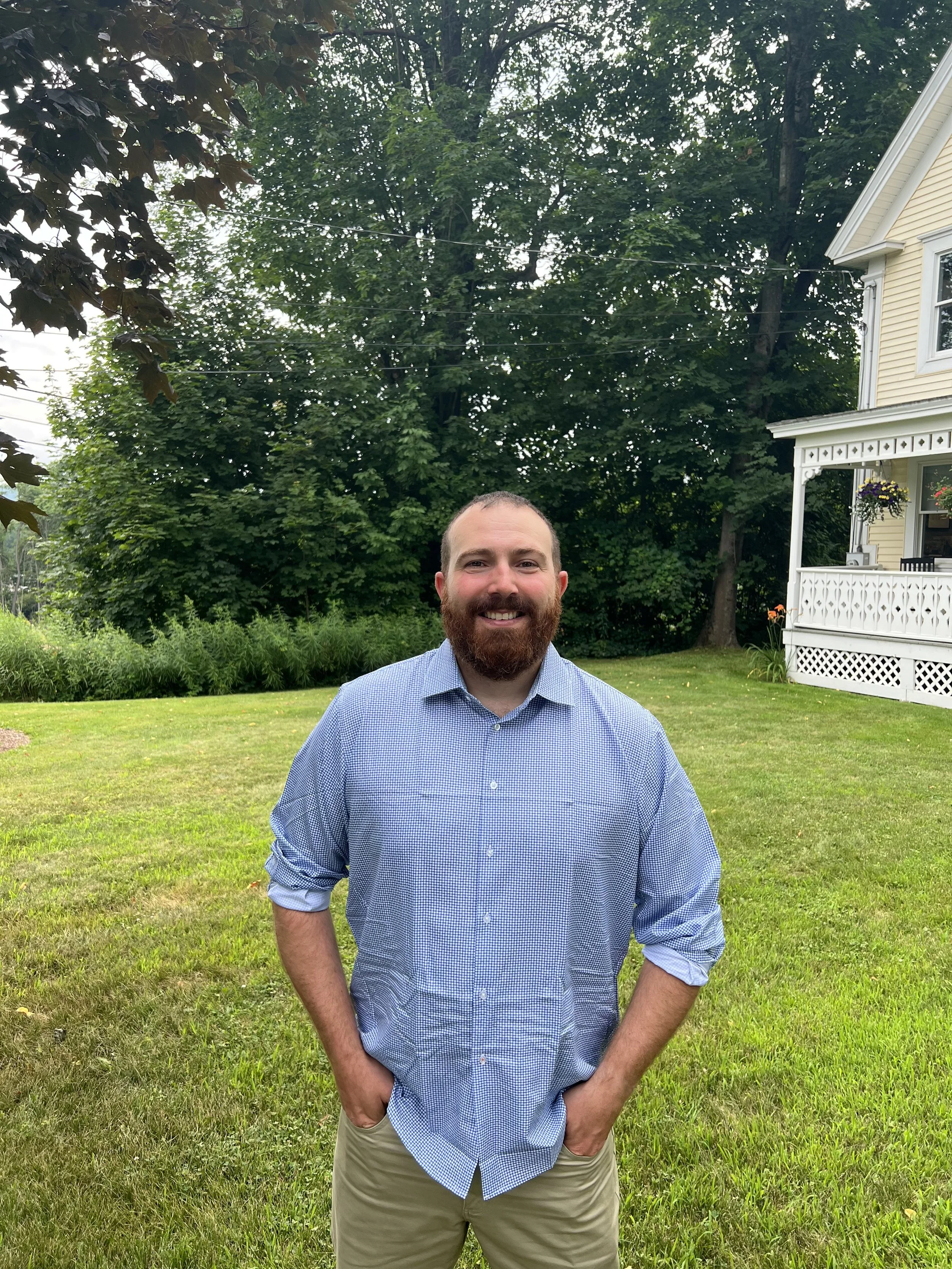Our Blog
Welcome to the Growing Roots Blog page - here we will showcase our involvement within the community, treatment and services that deserve to be highlighted and other exciting activities that we’re working on.
-
November 2025
- Nov 6, 2025 Going Home for the Holidays Nov 6, 2025
-
October 2025
- Oct 15, 2025 OCD Awareness Month Oct 15, 2025
-
September 2025
- Sep 16, 2025 Preparing for S.A.D Sep 16, 2025
-
August 2025
- Aug 27, 2025 Dealing with Change Aug 27, 2025
- Aug 13, 2025 Can AI Replace Your Therapist? Aug 13, 2025
- Aug 6, 2025 Gearing Up for Another School Year Aug 6, 2025
-
July 2025
- Jul 29, 2025 What Do We Have to Offer? Jul 29, 2025
- Jul 22, 2025 Self Care? Am I Doing it Right? Jul 22, 2025
-
June 2025
- Jun 25, 2025 PTSD Awareness Month Jun 25, 2025
- Jun 18, 2025 Men's Mental Health Month Jun 18, 2025
- Jun 11, 2025 Celebrating Pride Month in Rural New Hampshire: a How-To Guide Jun 11, 2025
-
May 2025
- May 14, 2025 Maternal Mental Health May 14, 2025
- May 7, 2025 Diet Culture: Why Trendy Diets Can Be Harmful to Your Health May 7, 2025
-
April 2025
- Apr 14, 2025 Helping Someone with a Substance Use Disorder—When They Don’t Think They Have One Apr 14, 2025
- Apr 9, 2025 Stress: Its Effects on the Body and Brain Apr 9, 2025
-
March 2025
- Mar 26, 2025 How Mental Health Can Change During the Spring Mar 26, 2025
- Mar 19, 2025 Self-Harm Awareness Month: Understanding, Supporting, and Breaking the Stigma Mar 19, 2025
- Mar 12, 2025 How To Get the Best Night's Sleep Mar 12, 2025
-
February 2025
- Feb 12, 2025 Six Inexpensive Ways to Reconnect with Your Partner This Valentine’s Day Feb 12, 2025
- Feb 5, 2025 Self-Love This Valentine's Day: 5 Ways to Care for Yourself Feb 5, 2025
-
January 2025
- Jan 29, 2025 Bucket List for 2025 Jan 29, 2025
- Jan 13, 2025 New Year’s Resolutions: Is it laziness or executive functioning that keeps us from reaching our goals? Jan 13, 2025
- Jan 2, 2025 How to Pick the Right Supplements: A Simple Guide to Choosing What’s Best for You Jan 2, 2025
-
December 2024
- Dec 18, 2024 Boundary Setting: During the Holidays Dec 18, 2024
- Dec 9, 2024 Holiday Stress: How to Avoid Overspending Dec 9, 2024
- Dec 4, 2024 How Laughter Can Improve Your Physical and Mental Health Dec 4, 2024
-
November 2024
- Nov 26, 2024 Ask a Therapist: How to Survive the Holidays while in ED Recovery Nov 26, 2024
- Nov 20, 2024 Thanksgiving Survival Guide Nov 20, 2024
- Nov 18, 2024 5 Tips to Mentally Prepare for Food Holidays While in Recovery Nov 18, 2024
-
October 2024
- Oct 16, 2024 Supporting Your Child Through Bullying: A Guide for Parents Oct 16, 2024
- Oct 2, 2024 Breast Cancer Awareness: Understanding, Prevention, and Self-Examination Oct 2, 2024
-
September 2024
- Sep 25, 2024 Embracing the Dark: Understanding S.A.D and the Power of Hygge Sep 25, 2024
- Sep 18, 2024 The Science of Happiness: Impact on Mental Health and Managing Digital Habits Sep 18, 2024
- Sep 12, 2024 Suicide Prevention: Statistics, Resources, and How to Make a Difference Sep 12, 2024
- Sep 4, 2024 Understanding Burnout: Causes, Symptoms, and Strategies for Recovery Sep 4, 2024
-
August 2024
- Aug 28, 2024 Navigating Grief: How People Cope and How Loved Ones Can Offer Support Aug 28, 2024
- Aug 21, 2024 The Power of Reiki: A Journey into Japanese Healing and Energy Balance Aug 21, 2024
- Aug 14, 2024 Preparing for Back to School: Tips for Mental Health and Smooth Transitions Aug 14, 2024
-
July 2024
- Jul 31, 2024 The Effects of Loneliness on Mental and Physical Health Jul 31, 2024
-
June 2024
- Jun 26, 2024 Understanding PTSD: Unpacking the Impact and Path to Healing Jun 26, 2024
- Jun 12, 2024 Ending the Stigma: Understanding Men’s Mental Health Jun 12, 2024
-
May 2024
- May 22, 2024 The Benefits of Meditation May 22, 2024
- May 15, 2024 Empowering Women: Advocating for Your Right to Healthcare May 15, 2024
- May 8, 2024 The Effects of Diet Culture May 8, 2024
-
April 2024
- Apr 17, 2024 How Therapists Destress: Tips and Strategies for Self-Care Apr 17, 2024
- Apr 10, 2024 The Benefits of Walking Apr 10, 2024
-
March 2024
- Mar 29, 2024 Interview With a Ketamine Patient Mar 29, 2024
- Mar 22, 2024 Healthy “Mocktail” Recipes Mar 22, 2024
- Mar 15, 2024 Understanding Sleep Apnea and How to Improve Your Rest Mar 15, 2024
- Mar 1, 2024 Social Media: Understanding Its Impact on Self-Esteem Mar 1, 2024
-
February 2024
- Feb 14, 2024 Attachment Styles and Relationships Feb 14, 2024
-
January 2024
- Jan 26, 2024 The Vital Role of Sunlight Exposure in Human Health Jan 26, 2024
- Jan 18, 2024 The Importance of Delayed Caffeine Intake Jan 18, 2024
- Jan 11, 2024 The Pennebaker Protocol Jan 11, 2024
- Jan 4, 2024 The Surprising Benefits of Sodium: More Than Just Salt Jan 4, 2024
-
December 2023
- Dec 23, 2023 11 Warning Signs of an Eating Disorder Dec 23, 2023
- Dec 21, 2023 Effective Communication Techniques for Building Stronger Family Bonds Dec 21, 2023
- Dec 20, 2023 7 Reasons to Digital Detox for the Holidays Dec 20, 2023
-
November 2023
- Nov 30, 2023 The Silent Struggle: The Impact of Eating Disorders on Mental Health Nov 30, 2023
- Nov 22, 2023 8 Ways Families Can Support A Loved One With An Eating Disorder During The Holidays Nov 22, 2023
- Nov 15, 2023 Managing an Eating Disorder During Thanksgiving Nov 15, 2023
- Nov 14, 2023 A Guide to Understanding Eating Disorders Nov 14, 2023
- Nov 2, 2023 The Impact of Negative Online Content on Mental Health Nov 2, 2023
-
October 2023
- Oct 30, 2023 5 Benefits of B12 Shots Oct 30, 2023
- Oct 18, 2023 What is NAD+ and how can it benefit your overall health Oct 18, 2023
- Oct 11, 2023 9 Benefits of Seeking Help For Mental Health Oct 11, 2023
- Oct 9, 2023 Mental Illness Awareness Week Oct 9, 2023
-
September 2023
- Sep 22, 2023 What is Functional Medicine? Sep 22, 2023
- Sep 20, 2023 5 Action Steps for Helping Someone in Emotional Pain Sep 20, 2023
-
August 2023
- Aug 31, 2023 7 helpful tips to address back-to-school anxiety Aug 31, 2023
- Aug 22, 2023 Recognizing the Signs: When to Seek Help for Your Mental Health Aug 22, 2023
- Aug 9, 2023 7 Reasons why couples counseling could be right for you Aug 9, 2023
- Aug 4, 2023 The Important Role Grief Plays In Our Lives Aug 4, 2023
-
July 2023
- Jul 27, 2023 Top 3 Ways To Stay Hydrated Jul 27, 2023
- Jul 24, 2023 45 Self-Care Ideas Jul 24, 2023
- Jul 20, 2023 What is Ketamine Assisted Psychotherapy? Jul 20, 2023
- Jul 13, 2023 What is a Stellate Ganglion Block Jul 13, 2023
- Jul 5, 2023 5 Reasons Why Summer Is the Best Time For Adolescents and Teens To Seek Help Jul 5, 2023
-
June 2023
- Jun 28, 2023 First Responders and PTSD Jun 28, 2023
- Jun 19, 2023 Misconceptions about PTSD Jun 19, 2023
- Jun 14, 2023 Men's Mental Health Statistics Jun 14, 2023
- Jun 5, 2023 Men's Health Month: Therapy for Men Jun 5, 2023
-
May 2023
- May 30, 2023 Mental Health Statistics May 30, 2023
- May 25, 2023 5 Ways To Improve Your Mental Health May 25, 2023
- May 22, 2023 The Stigma of Mental Health May 22, 2023
- May 10, 2023 Parenting & Mental Health May 10, 2023
-
April 2023
- Apr 27, 2023 The Impact of Stress Apr 27, 2023
- Apr 20, 2023 How to help an alcoholic Apr 20, 2023
- Apr 13, 2023 Understanding Sexual Assault Apr 13, 2023
- Apr 6, 2023 Signs & Symptoms of Alcoholism Apr 6, 2023
-
March 2023
- Mar 28, 2023 Symptoms of self-harm Mar 28, 2023
- Mar 22, 2023 Supporting Someone With Mental Health Illness Mar 22, 2023
- Mar 17, 2023 Good Sleep Starts The Moment You Wake Up Mar 17, 2023
- Mar 16, 2023 Cutting-Edge Treatment for PTSD, Depression, Anxiety, and Trauma Mar 16, 2023
- Mar 14, 2023 Social Media & Your Sleep Health Mar 14, 2023
-
February 2023
- Feb 21, 2023 The Power of Affirmations Feb 21, 2023
- Feb 13, 2023 Our New Location Feb 13, 2023
- Feb 8, 2023 5 Steps To Build Confidence & Self Worth Feb 8, 2023
- Feb 2, 2023 February is International Boost Self-Esteem Month Feb 2, 2023
-
January 2023
- Jan 17, 2023 A New Growing Roots... Jan 17, 2023
- Jan 9, 2023 Creating a habit Jan 9, 2023
- Jan 4, 2023 New Location Progress Jan 4, 2023
-
December 2022
- Dec 30, 2022 New Satellite Location Dec 30, 2022
- Dec 29, 2022 Pre-New Year cleansing tips Dec 29, 2022
- Dec 16, 2022 Stress Management at Woodstock PD Dec 16, 2022
- Dec 9, 2022 Are you constantly getting sick? Dec 9, 2022
- Dec 7, 2022 Disordered eating Q&A from New Hampton School students Dec 7, 2022
- Dec 2, 2022 We're moving! Dec 2, 2022
-
November 2022
- Nov 21, 2022 Integrative Medicine | Your First Appointment Nov 21, 2022
-
October 2022
- Oct 25, 2022 Ketamine Assisted Psychotherapy Client Testimonial Oct 25, 2022
- Oct 19, 2022 Holderness Central School Presentation Oct 19, 2022
What Do We Have to Offer?
Growing Roots Integrative Health and Wellness has been a constant in the Plymouth, NH community for years! Maybe you passed by our old office- on Main Street, right above Chase Street Market? We moved just a bit down the road to Warren Street a little over a year ago- into our own beautiful building!
We have grown so much over the past decade. Now we have a dedication (and AMAZING) staff of 17 that can assist with a variety of mental and physical health concerns. We are here for YOU.
Mental health issues can affect anyone, at any age. We understand the importance of finding the right therapist to help navigate and manage your unique and individual needs. Together, we will build a strong foundation of healthy communication and coping methods, aimed to strengthen your ability to manage the difficult internal reactions related to your life experiences. We look at how these experiences have shaped your understanding of yourself and the world and how they may contribute to other problems you would like to address.
We offer: Individual Counseling, Couples Counseling, Psychological Assessment, Ketamine Assisted Psychotherapy, Medication Management Services, and we hope to bring back NAD+ and Vitamin IV Therapy soon!
A number of our clinicians are accepting new clients. Think one of them might be a good fit for you?
Email us at office@growingrootsllc.com to book your first appointment!
Joe Acampora, MA, CMHC
Staff Therapist
Joe is a graduate of Adams State University, in Colorado, where he received a Master of Arts in Clinical Mental Health Counseling. He completed his graduate internships in non-profit roles focusing on grief and loss, youth and adolescent counseling, and addiction counseling. In the therapy room, Joe emphasizes building strong relationships with his clients and the importance of bringing his genuine self to the session, and values approaches built for the human sitting across from him. He typically employs an eclectic approach, drawing on techniques from psychodynamic, CBT/DBT, solution-focused, and person-centered therapy.
Joe completed his bachelor of science at the University of Vermont, and formerly worked in conservation biology, then working as a middle and high school science teacher before transitioning into clinical mental health counseling. When not in the therapy room, Joe enjoys hiking with his dog, auto racing, and planning for his next hunting season.
Specializations
Grief and loss, depression and anxiety, navigating relationships, career counseling, addiction/substance use, youth and adolescent counseling.
Deidre Rideout, MS, LCMHC, PMH-C
Staff Therapist | Licensed Clinical Mental Health Counselor | Certified Perinatal Mental Health Counselor
Deidre Rideout earned her Master of Science degree in Clinical Mental Health Counseling with her certificate in Addictions Treatment in 2021 from Plymouth State University. Prior to that, Deidre received a Bachelor of Science degree in Elementary Education with a K-8 teaching certification and a minor in Mental Health Studies from Plymouth State University.
Before entering the therapy world, Deidre worked as a teacher for seven years and has experience providing individualized support to children. Due to her previous work in private practice and at a community mental health center, Deidre has experience working with all ages in all walks of life, including people in crisis.
Deidre is perinatal mental health certified, as well as a trained ketamine assisted psychotherapy (KAP) provider. Deidre is passionate about working with adolescents and adults, including adults navigating motherhood and parenthood. Deidre provides person-centered care in an inclusive and supportive environment, and uses an eclectic clinical approach in therapy that utilizes skills from Cognitive Behavioral Therapy, Acceptance and Commitment Therapy, and Dialectical Behavioral Therapy. Deidre believes in meeting clients where they are at to help them develop lifelong strategies they can use to promote change in their lives. Deidre believes in honesty and openness in therapy, and strives to create a space where people feel safe, accepted, comfortable to confront anything.
Specializations
Perinatal mood and anxiety disorders, anxiety disorders, depression, PTSD, complex trauma, emotion regulation, self-esteem, & identity
Kirsten Nataren Crus, LCMHC
Staff Therapist | Licensed Clinical Mental Health Counselor
Kirsten earned a BA from Emory University in African Studies and Psychology and an MA in counseling from Dallas Theological Seminary. Prior to joining Growing Roots, Kirsten worked with adults and adolescents at an eating disorder treatment center. Due to her previous work in private practice, she has experience working with couples, Spanish speakers, and clients struggling with anxiety and depression.
As a therapist, Kirsten believes in creating a safe, accepting, and collaborative relationship to give people the foundation to grow and change. She believes in accepting people where they are, working with them to discover where they want to be, and encouraging them to make changes as they are ready. To her, it is important to talk openly and honestly about the client-therapist relationship and address any concerns the client may have. It takes a great deal of courage to be willing to reach out for help, and she is honored to be part of your journey.
Kirsten cree en la creación de una relación segura, de aceptación y de colaboración para dar a las personas la base para crecer y cambiar. Trabaja con clientes que experimentan ansiedad, depresión, trastornos de alimentación, y problemas con su pareja.
Specializations
Anxiety, Depression, Eating disorders, Relationship distress and couples counseling, Kirsten habla Español.
Bryan Randolph, LICSW
Director of Training and Development, Staff Therapist
As Licensed Independent Clinical Social Worker (LICSW), Bryan holds a Master of Social Work (MSW) and a Master of Science (MS) in Kinesiology, focusing on Adventure Therapy. With over 10 years of clinical experience, he has been involved in the behavioral health field since 2007.
He spent five years as a primary clinician at Mountain Valley Treatment Center, a leading residential facility specializing in Anxiety, Depression, PTSD, and Obsessive-Compulsive Disorder. His extensive training includes Cognitive Behavioral Therapy, Acceptance and Commitment Therapy, and Exposure and Response Prevention therapy. Specializing in Anxiety and OCD, he particularly addresses issues like academic perfectionism and social phobia.
Experienced in working with First Responders, including Fire Service, Law Enforcement Officers, and EMS personnel, he has completed training in Critical Incident Stress Management to meet the unique needs of these professionals.
In addition, he is trained in Accelerated Resolution Therapy (ART), which can address single incidents, complex traumatic events, and generalized conditions such as anxiety, depression, OCD, ADHD, and disordered eating. A distinctive feature of ART is that much of the processing is internal, allowing participants the option to discuss their issues.
Currently, he sees clients across the lifespan, including children ages 10 and up, teens, and adults. He collaborates with parents and school staff when appropriate, employing a systems approach to address issues holistically in both private and public school settings.
Passionate about working with a diverse range of clients, he feels particularly drawn to those who may be uncertain or resistant to therapy. Committed to providing individualized and collaborative treatment, he strongly believes in avoiding a "one size fits all" approach.
Specializations
Anxiety, Depression, OCD, PTSD, ADHD, Sex/Sexuality, LGBTQIA+, First Responders, Issues related to aging/ change in life status.
Maggie Barton, MSW
Staff Therapist | Pre-Licensed Social Worker
Maggie recently graduated from University of New Hampshire with a Master's in Social Work and received her undergraduate degree in Sociology from Bates College in 2020. Before joining the Growing Roots team, Maggie worked at The White Mountain School, a college preparatory school in Northern New Hampshire. There she held a variety of roles including: Wellness Coordinator, Counselor, Dorm Head, and Math Teacher.
Maggie enjoys working with children, adolescents, and young adults. She utilizes a client-lead, strength-based approach in working with clients to identify their goals and collaborate in building their toolkit to reach them. Her clinical approach incorporates several evidence-based approaches, including Cognitive Behavioral Therapy and Acceptance and Commitment Therapy. Maggie believes in the value of understanding yourself and what works for you as you endure life’s challenges and appreciate its joys.
Specializations
Children and adolescents, emotional regulation, anxiety, and ADHD.
We are so proud to be a part of the Plymouth community. Thank you so much for your years of dedication and support. We couldn’t be here without you.
Self Care? Am I Doing it Right?
Written by Halsey Redman
In the age of mental health awareness, “self-care” has become a popular buzzword. We're constantly reminded to rest, take bubble baths, set boundaries, and treat ourselves with compassion and that’s a good thing. But somewhere along the way, a subtle confusion has crept in. Sometimes what we call “self-care” is actually avoidance in disguise.
So how do we tell the difference?
What Is Self-Care?
True self-care isn’t always glamorous. Sure, it can look like candles and a Netflix night, but more often than not, it’s about making choices that serve your long-term well-being.
Real self-care might look like:
Going to therapy even when you’d rather not talk about it.
Saying no to that third drink because you know how it’ll make you feel tomorrow.
Turning off your phone and going to bed early.
Meal prepping for the week even though takeout would be easier.
Facing uncomfortable conversations rather than letting resentment grow.
Self-care is about restoring yourself, not numbing yourself.
What Is Avoidance?
Avoidance is about escape. It’s doing what feels good in the moment to avoid what feels difficult. It often gives short-term relief but leads to long-term discomfort or stagnation.
Avoidance might look like:
Scrolling for hours to ignore anxiety.
Telling yourself you need a “mental health day” every time stress builds up, without ever addressing the cause.
Binge-watching shows instead of studying or working through a problem.
Ghosting people to avoid confrontation, then feeling isolated later.
Labeling everything as “toxic” to avoid uncomfortable growth.
Avoidance whispers, “You don’t have to deal with this right now.” And sometimes, that's okay. But if it becomes a pattern, you may find yourself stuck.
Intent and Impact
One way to tell the difference is to ask yourself these two questions:
What is my intention?
Am I doing this to take care of myself, or to avoid something hard?What is the impact over time?
Does this action help me feel more capable, rested, and grounded-or more disconnected, stressed, or stuck?
Self-care often requires effort, while avoidance often offers instant relief. But the long game is where the distinction becomes clear: self-care helps you grow; avoidance keeps you running.
You Don’t Have to Get It Perfect
Sometimes you need a night off. Sometimes avoiding something is a form of self-preservation. This isn’t about judgment- it’s about honesty. Self-compassion means acknowledging when you’re overwhelmed without pretending that escape is always healing.
You’re allowed to rest, but you’re also capable of rising.
PTSD Awareness Month
Post-Traumatic Stress Disorder (PTSD) is a mental health condition that can affect anyone who has witnessed or experienced a traumatic event. While many people are familiar with PTSD from media portrayals or stories about soldiers returning from war, it can impact a wide range of individuals. From survivors of natural disasters to victims of abuse or car accidents, PTSD does not discriminate based on background, age, or gender.
What is PTSD?
PTSD is a mental health disorder that can develop after someone has experienced or witnessed a life-threatening or deeply disturbing event. It’s normal to feel fear, sadness, or anger after a traumatic experience, but for some, those feelings don’t go away. In fact, they might intensify and disrupt daily life.
The symptoms of PTSD can vary from person to person but generally include:
Flashbacks: Reliving the traumatic event as though it is happening again.
Nightmares: Recurrent, disturbing dreams related to the event.
Avoidance: Steering clear of reminders of the trauma (places, people, situations).
Hypervigilance: Being easily startled, feeling tense or "on edge," or having difficulty relaxing.
Emotional Numbness: Feeling disconnected or detached from others, or losing interest in activities once enjoyed.
Negative Thoughts: Difficulty feeling positive emotions, or having a distorted sense of guilt or blame.
These symptoms can last for months or even years, and for some, they become chronic, affecting their ability to function socially, emotionally, or professionally.
Causes and Risk Factors
While the cause of PTSD is directly tied to a traumatic event, not everyone who experiences trauma develops the disorder. Factors that can contribute to someone developing PTSD include:
Severity of the trauma: The more intense and prolonged the event, the higher the risk.
History of trauma: Individuals who have experienced past traumas (childhood abuse, for example) are more likely to develop PTSD after subsequent traumatic events.
Biological factors: Genetic factors and the way a person’s brain reacts to stress may increase susceptibility.
Lack of support: People who don't have a strong network of friends or family to help them process the trauma may be at higher risk.
Pre-existing mental health conditions: Those who have anxiety, depression, or other conditions might be more vulnerable.
How PTSD Affects Daily Life
Relationships: Trust can be broken or weakened, and emotional distance often grows between people with PTSD and their loved ones. They may seem irritable or withdrawn, leading to misunderstandings.
Work or School: Concentration and productivity often decline. PTSD sufferers might struggle to focus or engage in tasks, especially if triggers are present in their environment.
Physical Health: Chronic stress, anxiety, and sleep disturbances can contribute to long-term physical health issues, such as headaches, gastrointestinal problems, and a weakened immune system.
Treatment Options for PTSD
The good news is that PTSD is treatable. Although recovery is often a long journey, there are several evidence-based therapies and treatments that have proven effective:
Psychotherapy (Talk Therapy):
Cognitive Behavioral Therapy (CBT): This is one of the most common and effective forms of therapy for PTSD. CBT helps individuals identify and change negative thought patterns and behaviors that stem from trauma.
Prolonged Exposure Therapy (PE): This therapy encourages individuals to gradually face the memories and situations that trigger their PTSD, helping them process the emotions tied to those experiences.
Eye Movement Desensitization and Reprocessing (EMDR): This is a specialized therapy that helps individuals process traumatic memories using guided eye movements or other types of bilateral stimulation.
Ketamine Assisted Psychotherapy (KAP): The use of Ketamine has extensive evidence supporting its safe and effective use for Treatment Resistant Depression, PTSD, OCD, Eating Disorders, and Anxiety. KAP has proven to soften habitually unhelpful ways of thinking and open new neural pathways which can allow for new motivation, capacity to feel joy and hope.
Medication:
Antidepressants such as SSRIs (Selective Serotonin Reuptake Inhibitors) are commonly prescribed to help manage the symptoms of PTSD. Medication can help alleviate some of the anxiety, depression, and intrusive thoughts associated with the disorder.Support Groups:
Joining a support group where individuals can share their experiences in a safe, confidential environment can help reduce feelings of isolation. These groups also provide insight into how others cope with similar challenges.Mindfulness and Relaxation Techniques:
Practices such as meditation, yoga, and deep-breathing exercises can help people manage stress and stay grounded in the present moment. These techniques can complement more formal therapies and help PTSD sufferers regulate their emotional and physical responses.
Moving Forward
One of the most challenging aspects of PTSD is the stigma that still surrounds mental health disorders. Many individuals feel ashamed or weak for experiencing symptoms like flashbacks or anxiety. This stigma often prevents them from seeking help, which can delay recovery.
It's crucial that we change the narrative around PTSD. Those affected by it are not "weak" or "broken" they are resilient individuals who have experienced something traumatic and are working hard to heal. Acknowledging the complexity of PTSD and offering compassion rather than judgment is key to creating a more supportive environment for those who need help.
PTSD is a condition that requires time, support, and understanding to heal. If you or someone you know is struggling with PTSD, remember that it is okay to ask for help. Healing is not linear, but with the right resources, support systems, and professional guidance, recovery is absolutely possible.
If you're unsure where to start, consider reaching out to a mental health professional who can guide you toward appropriate treatment options. You don’t have to go through it alone.
Conclusion
PTSD is a serious condition that affects millions of people, yet it is often misunderstood. By educating ourselves about the symptoms, causes, and treatment options available, we can foster a more empathetic and supportive world for those affected. Let’s continue to have open conversations, break the stigma, and ensure that individuals with PTSD get the care and respect they deserve.










